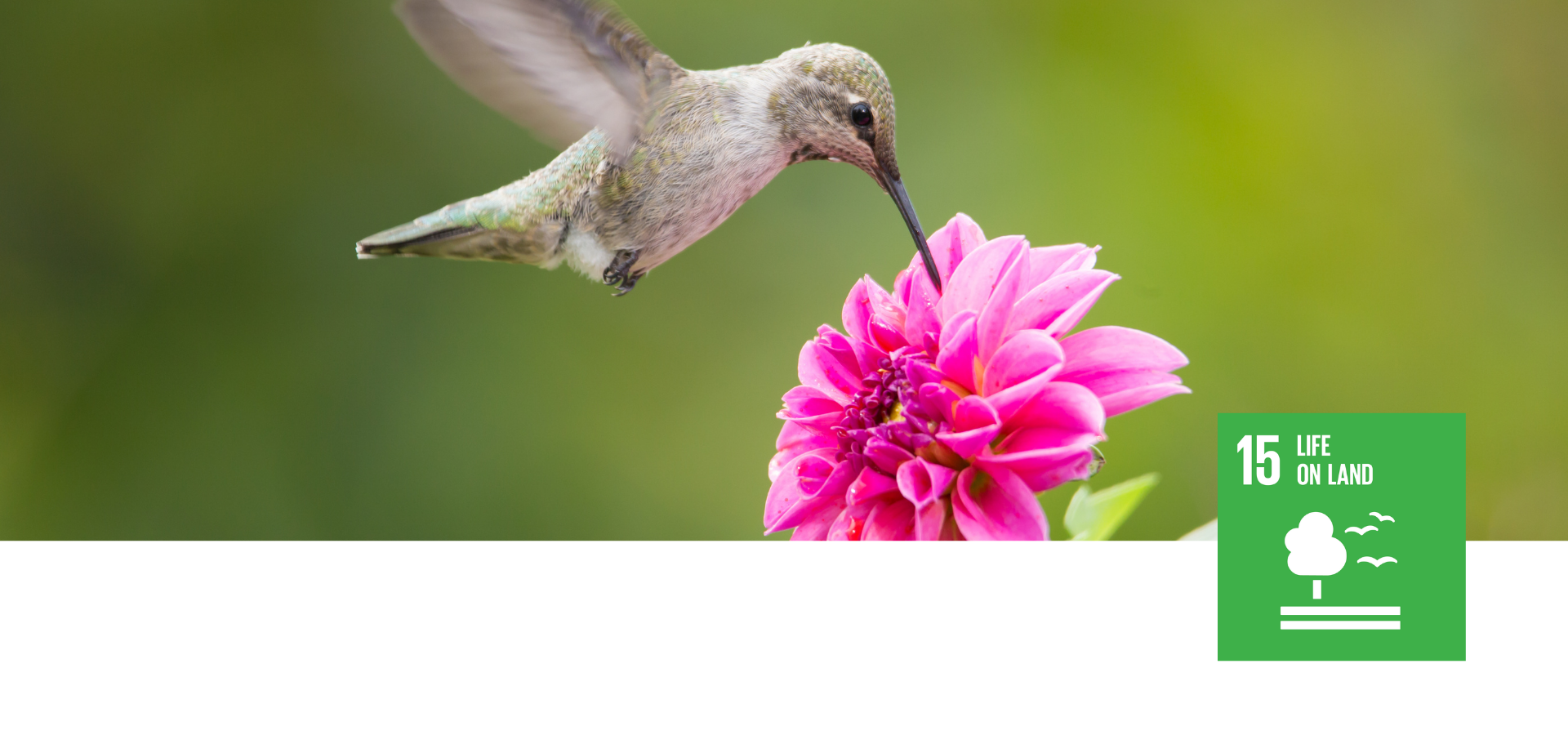
SDG 15: Life on land
To address the loss of biodiversity due to climate change and human activity, HKUST recognizes the importance of responsible land management practices and preserving the health of terrestrial ecosystems. We promote the conservation and sustainable use of land resources through our policies while also raising awareness through community outreach efforts and encouraging research that helps halt biodiversity loss.
Curriculum
71 related courses were offered in the 2022-23 academic year.
Research
According to Science Direct, from 2019 to 2023, HKUST published 58 research papers addressing SDG 15.
About 31% of them are in the top 10% cite score and around 83% are internationally co-authored.
Research Highlights
Publication
In the publication of "Phosphorus internal loading and sediment diagenesis in a large eutrophic lake (Lake Chaohu, China)", the team successfully quantifies the internal sediment phosphorus (P) release in whole Lake Chaohu.
Green AI
HKUST's expansive green spaces are home to over 100 bird species, including many that are unique to Hong Kong. Recognizing the vital role birds play, You Will See a Hoopoe, uses Green AI cameras deployed at certain locations on campus can capture bird images and analyze the data, before sharing it with the public. This Living Lab project allows staff and students to get to know the richness of the biodiversity of the HKUST campus and encourages the public to send in photos of birds that they take on campus and use them to train the AI model for bird identification.
Hydrochar Project
The Upcycling Yard and Food Wastes into New Resources: Hydrochar for Supporting HKUST Greening Project was born to combat the challenges of managing large amounts of waste generated in Hong Kong daily. Not only does it take up huge land spaces, but its degradation and composting also create undesirable odors. The hydrothermal carbonization (HTC) process is then used to transform these low-value wastes into a higher-value resource called hydrochar, a solid, carbon-rich material that can be used to restore ecosystems and maintain their biodiversity while potentially giving economic and social benefits.
This Smart Sustainable Campus as a Living Lab project used AI cameras to detect bird species on campus
Policy
Sustainable Catering Policy
Our Sustainable Catering Policy extends the university’s responsible land management practice to our catering partners, requiring them to develop and share a sustainable food practices plan that reduces their environmental impacts.
Our caterers are also encouraged to use Environmentally Preferable Cleaning Chemicals and comply with recognized green labelling organizations to minimize the impact of chemicals on plant and animal habitats
Community Engagement
Sustainable Agriculture
The EcoFish Series engaged students by showcasing sustainable aquaculture practices in local fishponds, highlighting the importance of reducing pressure on wild fish populations and conserving marine and coastal ecosystems.
Farming with Grow Something HK event also introduced organic gardening methods and offers a hands-on experience with transplanting lettuce seedlings, promoting sustainable agriculture and environmental awareness.
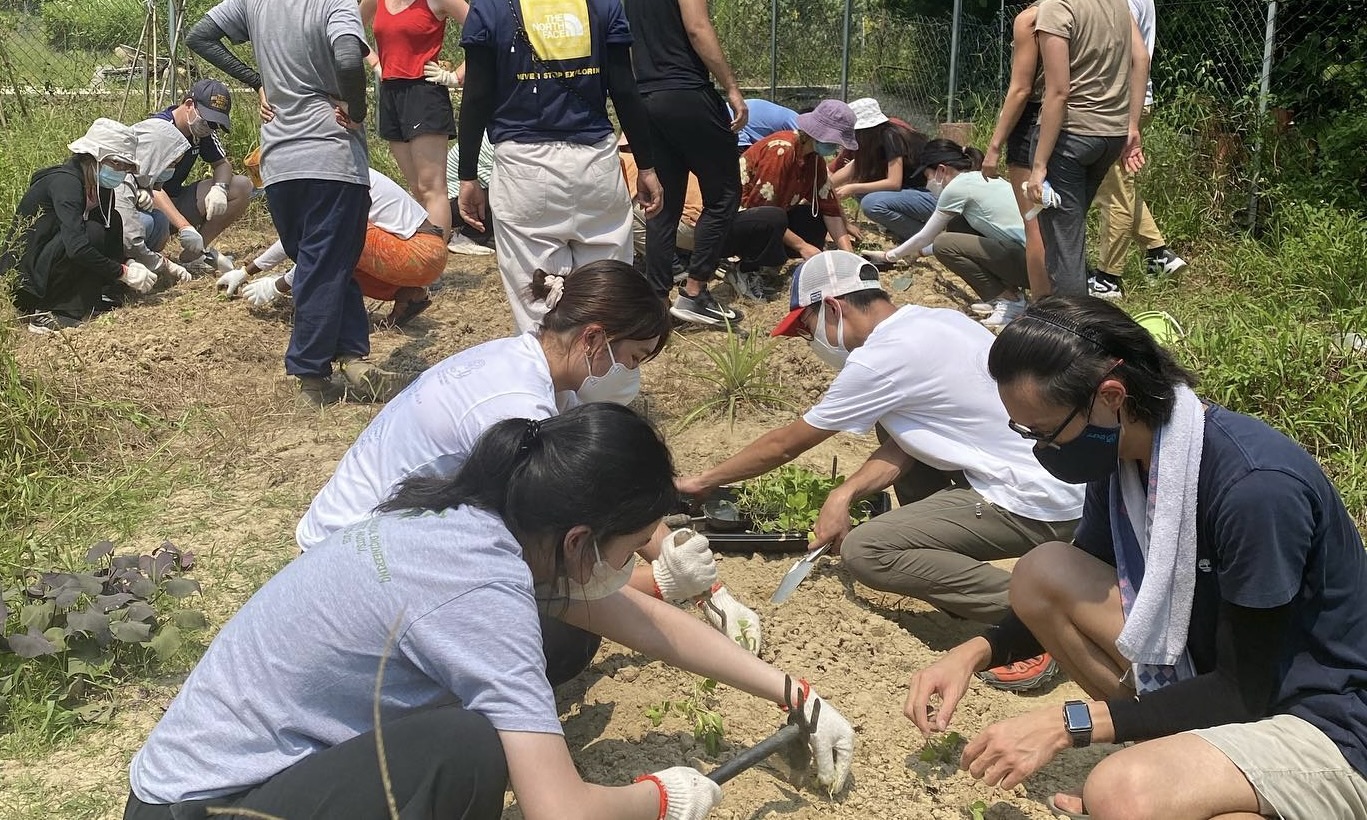
September 2022: Students are introduced to organic gardening methods and learn to transplant lettuces seedling
The HKUST Biodiversity Map
HKUST actively identify, monitor, and protect biodiversity affected by operation of the university.
The HKUST Biodiversity Map project aims to strengthen knowledge and awareness of local biodiversity and conservation among students and the HKUST community. It promotes active learning and engagement through field trips, designing biodiversity routes, and creating educational materials. The project provides a flexible learning atmosphere outside the classroom, fostering a sense of belonging and appreciation for nature among HKUST members.
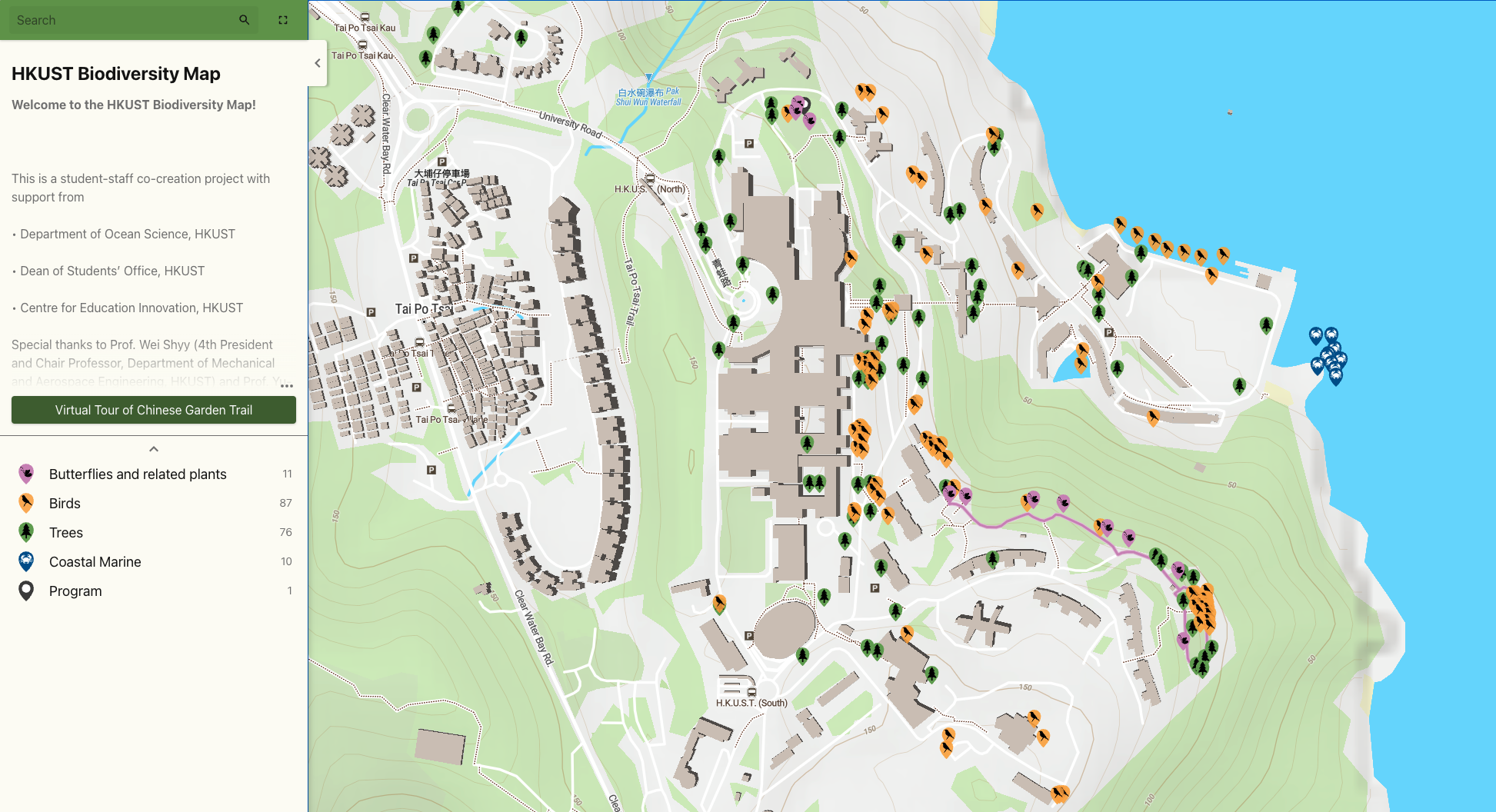
HKUST Biodiversity Map and virtual tours present a systematic collection of biodiversity information and photo albums to strengthen knowledge and awareness of local biodiversity and conservation.
HKUST Connect
HKUST Connect organized a range of volunteer events that not only provided opportunities for students to actively engage in community service but also promoted the conservation and restoration of terrestrial ecosystems, the protection of endangered species, and the responsible management of natural resources.
As part of HKUST Connect's outreach, 12 HKUST volunteers took part in the Habitat Conservation Tour at the Fung Yuen Butterfly Reserve which houses over 200 butterfly species. This event was organized as a collaborative educational learning trip with the Taipo Environmental Association. The association preserves biodiversity through understanding the role that butterflies play in maintaining a balanced natural environment, as well as the human intervention needed to support healthy ecosystems for butterflies.
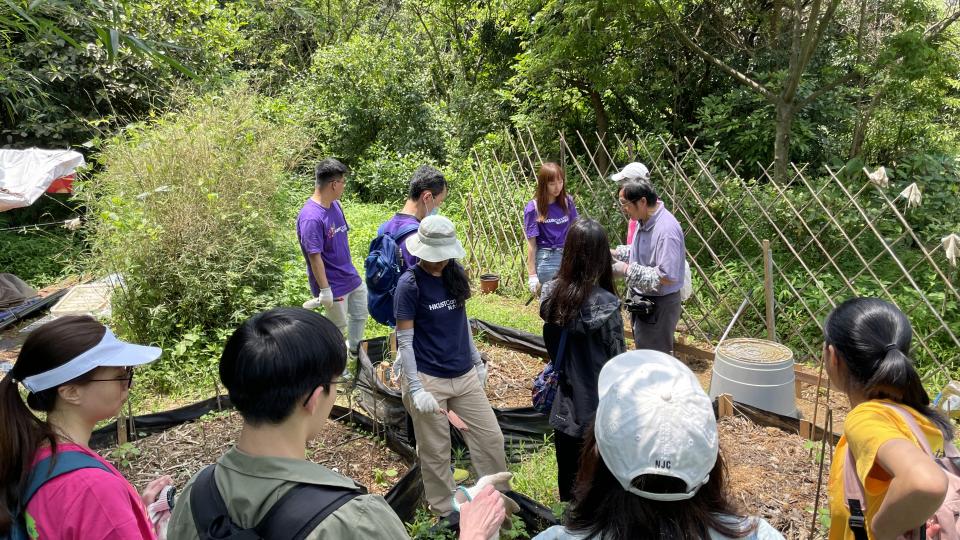
30 April 2023: Volunteers being demonstrated the work done to preserve butterfly habitats
Furthermore, HKUST Connect organized in collaboration with a local animal rescue organization, Sai Kung Stray Friends, In Step with Dogs served as an opportunity for HKUST students to volunteer at an animal shelter. Through caring for and bonding with these furry friends, students were able to understand and appreciate responsible management of life on land. In addition, this event could potentially grow in the participants a humble persona and willingness to serve the community.
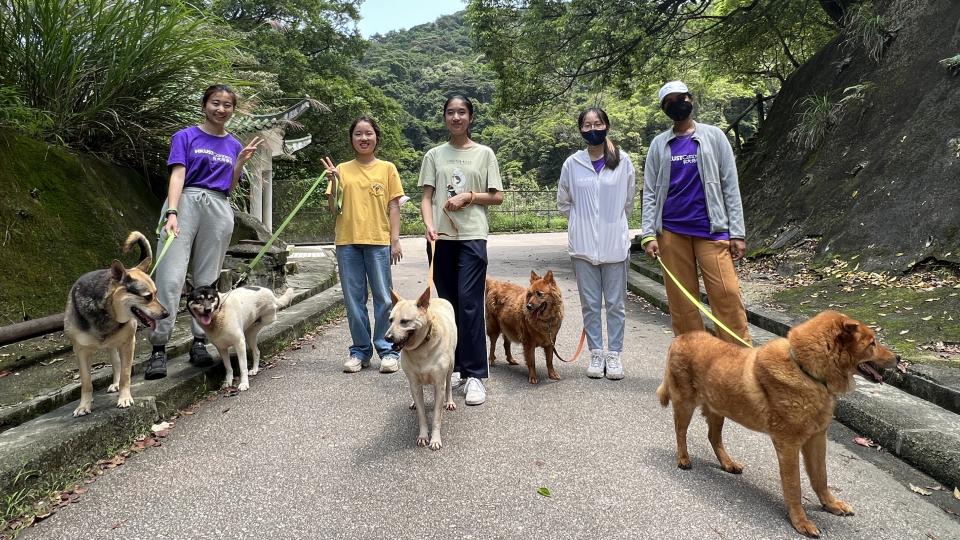
28 April 2023: HKUST volunteers with dogs from the shelter
Other events like Exploration in Butterfly Reserve, Cat Shelter “Purr-fecting” Action, Hike without Trace, Beach Cleanup @ HKUST and Rock Cleaning Angels, volunteers gained awareness of environmental issues and contributed to the conservation of terrestrial and marine ecosystems, the protection of endangered species, and the promotion of responsible nature stewardship.
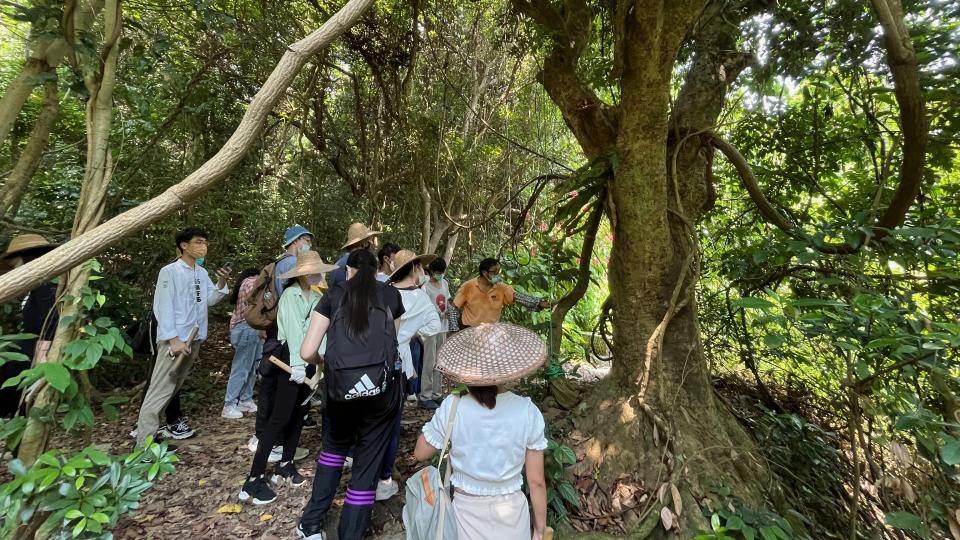
September 2022: Exploration in Butterfly Reserve
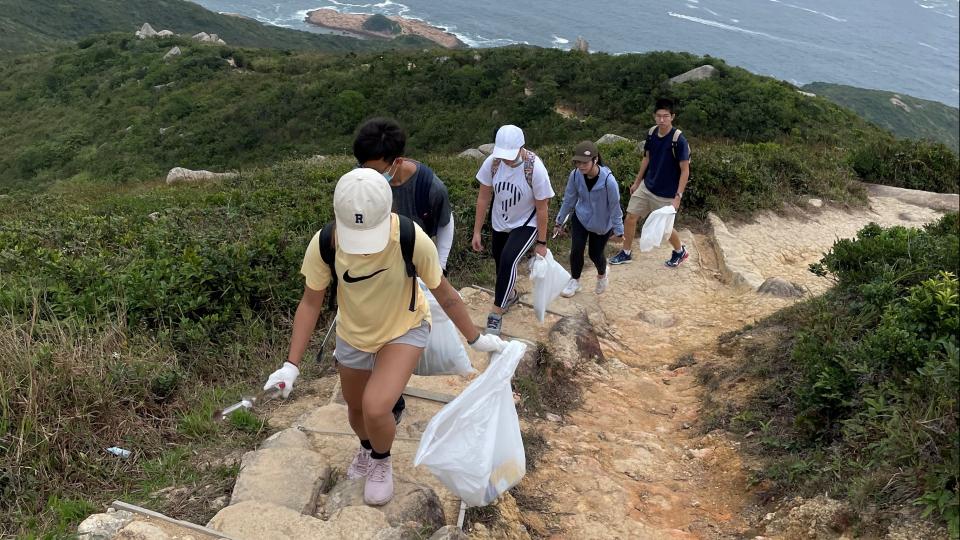
November 2022: Hike Without Trace
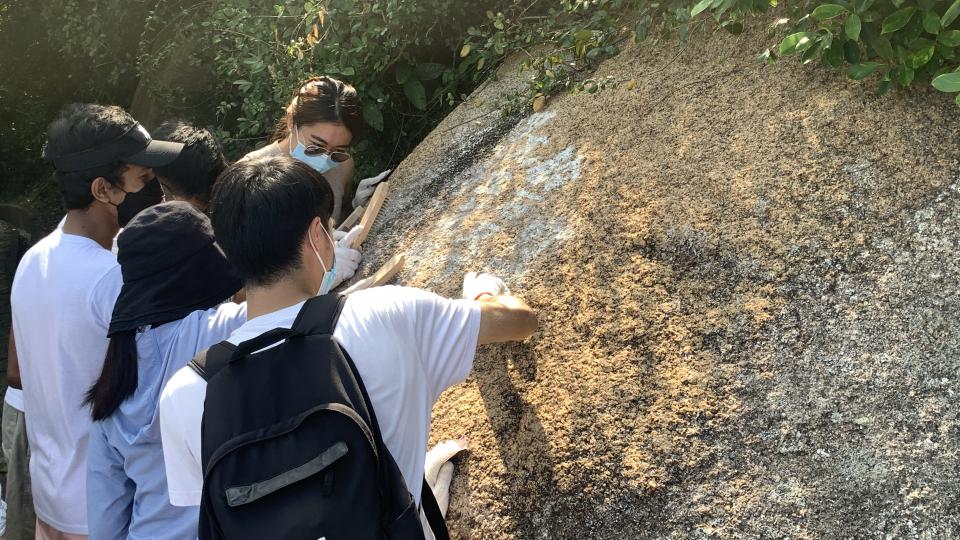
November 2022: Rock Cleaning Angels
Waste
Reduce Plastic Waste
The university aims to reduce landfill waste by 50% through campaigns like Bottled Water-free Campus Campaign and kicking open doors for carbon reduction efforts through the AI-driven Reusable Meal Container Lending System, a first of its kind, eliminating 300 disposable lunchboxes from landfills pushing down carbon emissions.

JSCCP AI Meal box Lending Machine Program Piloted on HKUST Campus.
The ban of single-use bottled water on campus since 2018 removed the sale of single-use plastic bottled water of 1 Liter or less. This policy is approximated to have eliminated the use of 22,000 disposable plastic water bottles monthly, or about 1,500,000 bottles since it was applied up to June 2023. Initiatives include distributing reusable UST branded water bottles to new students, installing water fountains with bottle-filling capabilities, and raising awareness about the environmental impact of plastic bottles. Offices and departments are encouraged to eliminate disposable bottles at meetings and events, opting for reusable alternatives. The campaign has garnered support from various units, and students are encouraged to bring their own bottles and refill them at water fountains. By promoting sustainable options, HKUST seeks to reduce plastic waste and promote a culture of environmental responsibility.
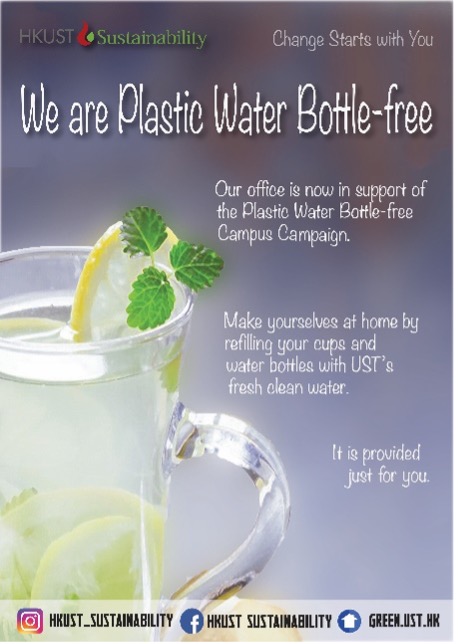
Plastic Water Bottle-free Campus Campaign
Waste Disposal and Safely Removing Hazardous Materials
HKUST is licensed by the EPD to use the sewage system leading to the Junk Bay sewage treatment plant and must conform to the terms and conditions of this license. HSEO (Health, Safety and Environment Office) regularly samples and analyzes the sewage waste stream at various monitoring points to ensure HKUST's compliance with the effluent standards set by the EPD as stated in Chapter 19 of the Safety and Environmental Protection Manual and regulatory controls for disposal of hazardous materials. These guidelines apply to disposal done by all departments at HKUST including laboratories.
Biodiversity and Ecosystems
Biodiversity in Planning and Development Process
During the Martin Ka Shing Lee Innovation Building construction process in late 2022, HKUST demonstrated deep appreciation of biodiversity by minimising the trees to be felled, resulting in a retainment rate of 34% Acacia trees from the site. The 66% of existing trees that were felled had poor form or low amenity value and was repurposed into planks, brought back to campus in the form of new tabletops, paneling, signages, and souvenirs. Through this effort of completely utilizing resources effectively, HKUST is trapping the carbon dioxide and preventing its greenhouse gas emissions by around 75 tons.